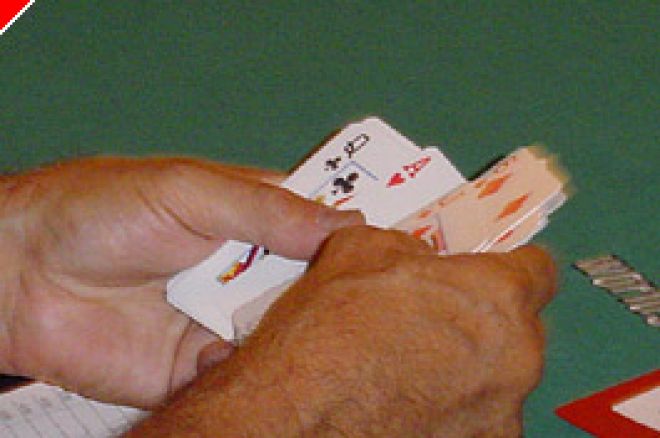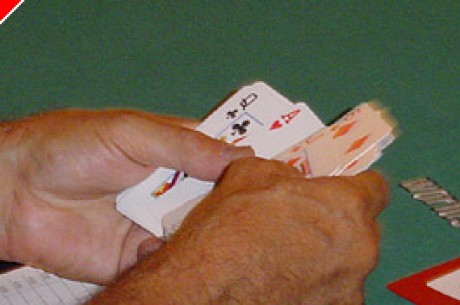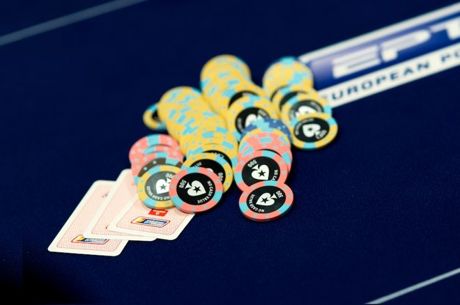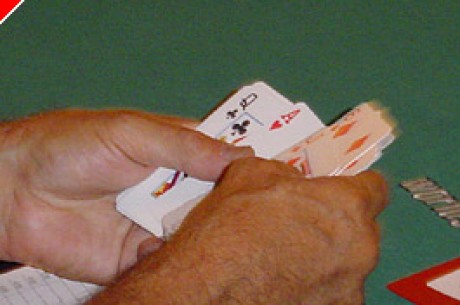Stud Poker Strategy - Playing Small Pairs With Small kickers

I think more people lose more money on low pairs with medium or low kickers than any other starting hand in 7-Card Stud. I suppose there might be player tracker stats available from some source to confirm or refute this assertion. I'd be interested in knowing the statistical truth. But from my experience it's true anyway. Low pairs with less than great kickers equal danger.
This isn't to say that you shouldn't play them. But there are many factors that go into making an informed decision about whether to play the hand or not. I'd like to review them here.
Two immediate considerations are whether the pair and the kicker are live. As far as how live it is, I'm more concerned about the pair than the kicker, but if I'm going to play them for more than the bring-in I usually want them both completely live.
I want to play any low pair with a low kicker for only the bring-in if I can. I want it to be as cheap as possible to see if I hit my next card to give me trips. So position is critical. If the bring-in is to my right and I have a couple or three premium cards to my left, then I'm less likely to call the bring-in, fearing a raise after my call. But this too depends on another factor - the difference between the bring-in bet and the full bet.
For example, if I'm in a $2/4 game with a $1 bring-in (popular on line) then I'm more inclined to call the bring-in even if I'm early in the action and followed by a few premium cards. That's because the difference between the bring-in and the full bet is not very great. The bring-in is a full 50% of the full bet - very large - meaning that the difference between calling the bring-in and calling the full bet after calling the bring-in is the same. On the other hand, in a $20/40 game I'm much less inclined to call that bring-in with the same cards in the same position because a raise will make the hand unplayable, the raise making it three times on the bring-in more to play.
The other consideration is how aggressive the other players in the game are. If, for example few players raise the bring-in, then I'm more inclined to call the bring-in. In an aggressive game I'm less likely to play it.
I also want to think about what my opponents are likely to have bassed on their betting action, their position and the other cards that are out. If, for example, a few players have called the bring in, including an Ace, then I am more likely to call it too with a low pair because I am less afraid that someone after me will raise - since they probably know that they're unlikely to knock out the players who already called - especially the player with the Ace. On the other hand if no one has called the bring in and an Ace remains after me, then I'm more likely to fold, fearing that the Ace will probably raise to steal the antes if nothing else - especially in a game with a large discrepancy between the bring-in and the completed bet.
I am very slightly more inclined to call the bring-in with a low pair if two of my cards are suited and if they are very live - but this is a small consideration indeed as is the consideration of two consecutive cards. I'm much more concerned about whether my pair is live, my overcard is live and whether I think the pot is likely to be raised.
Here are a few examples of how I play a hand on Third Street with a low pair and a low kicker.
$10/20 Stud $3 bring in
I have (3c7d)7s
To my left the players have:
Rick: 9d
Bret: Qs
Sara: 4c
Geni: 4s
Malo: 8h
Zeus: 2c
Pitt: As
Rick is loose and passive. Bret is a rock, Sara is average, Geni is wild, Malo is clueless, Zeus is a rock, Pitt is loose and aggressive.
The 2c brings it in and the As calls. I'm likely to call too since my cards are live, Pitt is in to intimidate the rest not to raise (since he won't fold) and Bret is a rock.
But here's a similar situation with different position for me.
I have (3c7d)7s
To my left the players have:
Rick: 9d
Pitt: As
Bret: Qs
Sara: 4c
Geni: 4s
Malo: 8h
Zeus: 2c
Now I must act before Pitt who is likely to raise because he's a wild player and he has an Ace. If this were a $2/4 game and the raise was only to $2 I might be tempted to call anyway and just see if I hit my trips on Fourth Street. But in the $10/20 game with a tripling of the bring-in I am not going to call the bring-in at all - knowing that I'm going to have to call $10 to see Fourth.
Another consideration is the likelihood that I'll be called down if I hit my trips. This depends on a number of factors. First of all, is my pair hidden? If it is, then I'm much more likely to call since no one will know that I hit my trips and so they'll be much less inclined to fold when I bet with them. (66)56 is much more likely to win my opponent's money than is (65)66.
But I also have to take into consideration the type of players I'm against. If I'm against rocks and I pair my door card they're going to fold, even if they have a higher pair. They're rocks. That's what they do. On the other hand if I'm against a loose, passive or otherwise poor player who is pretty much in until the river once he's in then I'm more likely to call and see Fourth Street because I know that if I hit I'll make a lot of money. But in technical terms, I'll be more likely to call if my implied odds are greater because of my opponents' likelihood of calling me.
One final consideration is how high my opponent's cards are and whether they are duplicated elsewhere. I don't want to run into higher trips if I hit my hand on Fourth. So, ideally, I will be up against players either with a lower up card than my pair or a duplicated up card. I'm more likely to call with two Kings a 3 and a 4 after me if I have a pair of 7s then if I have one King a 9 and ten and a Jack yet to act. That's because if there are two Kings out, it's less likely that either of the Kings will hit trips than if only one King's out - though either King is more likely to have a pair. So if a King raises I'll fold because I'm far behind. But if either King calls then I'm not worried that he'll hit trips if I hit my trips. Similarly, it's less likely that someone will hit higher trips when the remaining cards are lower than my pair - low though my pair may be.
To summarize, the more of the following conditions that are in your favor, the more you should tend to call with your low pair:
1. you have a kicker that is higher than all of the other cards that are out
2. your pair is hidden
3. your pair and your kicker are fully live
4. the remaining opponents who have not yet acted are not likely to raise
5. your remaining opponents are likely to pay you off if you hit
6. your pair is higher than the remaining cards yet to act
7. the higher cards remaining to act are duplicated elsewhere
8. the bring-in is a small percentage of the full-bet (unless you are very confidant of number 4)
Ed Note: Great stud action always at Pacific Poker








